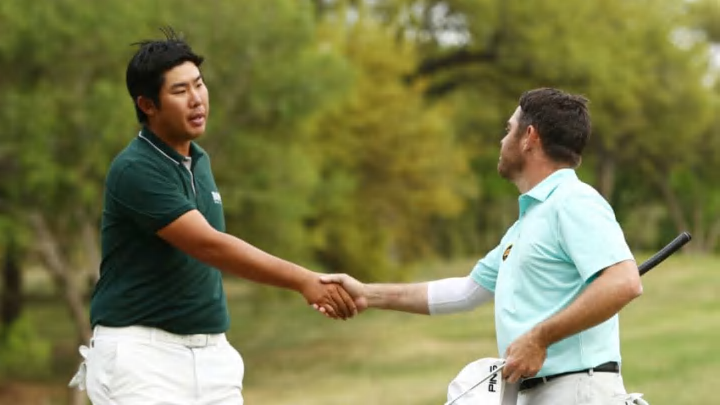The WGC-Dell Match Play brings out strong opinions in folks, especially those who insist on the “tradition” of medal play. The latest poster boy: Ben An, who out-played the field in Austin, but failed to advance to the Match Play round of 16
If you want to understand the difference between match play and medal play, ask Ben An.
Through his three group matches at the WGC Dell Match Play at Austin Country Club, An completed his 46 holes in 12-under par. Extended to a normal 54 holes for three rounds, that would translate to -14.09, which would have matched Paul Casey for the field’s best showing.
But not only will An not win the Match Play event, he didn’t even make the final 16. An went just 1-2 in his three group play matches. Despite playing 1-under par golf, he lost 3 & 2 Wednesday to Tommy Fleetwood. On Thursday he played minus-4 golf but lost 1-up when Louis Oosthuizen matched him. An posted a sensational -7 through 13 holes to dismiss Kyle Stanley Friday, but when Oosthuizen beat Fleetwood, An was essentially playing dead.
Like An, Oosthuizen also had a superb week, playing 11-under par through his 48 holes.
Those enigmatic sorts of results that throw two of the tournament’s five hottest players together in a group only one can survive are part of the reality, and possibly the charm, of match play. It is generally understood, at least abstractly, that the player who records the lowest overall score won’t necessarily emerge with the title; that to a degree, at least, the outcome is decided as much by who you play and when you play as how well you play.
The Match Play’s group results provide several illustrations.
Of the 16 who advanced into group play, only eight ranked among the 16 best group play scores as measured by their medal play performances. Six of the group winners, Oosthuizen among them, advanced ahead of competitors who outplayed them based on medal play results. Lucas Bjerregaard advanced despite completing his 50 group holes in just two strokes under par, a total that ranked him 53rd among the 64 players when the group results had been translated to medal play scores.
Bjerregaard emerged from a group that also included Justin Thomas, Matt Wallace and Keegan Bradley. Of the four, Thomas actually played the best, but at just 4-under par for 49 holes he wasn’t compellingly good. That enabled Bjerregaard to slip through. When they played head-up on Wednesday, Bjerregaard managed an indifferent one-under but Thomas shot one-over. On Thursday Bjerregaard and Bradley halved their match, Bradley shooting plus-one and Bjerregaard plus-two. The group clincher Friday occurred when Bjerregaard matched Wallace’s minus-three, a result that was good enough for a one-up victory.
Haotong Li’s advance was a slightly upgraded version of Bjerregaard’s. He played 49 holes in just three-under par, only the third best showing in his group. But he caught both Alex Noren and Brooks Koepka on their one bad day. Li actually beat Koepka despite shooting over par Thursday.
If Bjerregaard and Li were among the fortunate ones, An was not alone in drawing a short straw. Six players recorded medal scores that would have translated to double-digit under-par scores if extended to 54 holes, yet failed to survive the group stage. The other five were Noren, Dustin Johnson, Ian Poulter, Abraham Ancer and Tommy Fleetwood.
Given the different natures of match play and medal play, the fact that the guy with the lowest score doesn’t win shouldn’t really be a surprise. Nor is it necessarily a problem; match play merely calls on a different set of skills. But it is also not unusual for fate to play an outsized role in determining a match play tournament’s outcome. The history of the PGA Championship provides dozens of examples on record.
For its first 39 iterations through 1957, the PGA was contested at match play. In those 39 competitions, the player with the best medal play total – based on strokes under par per number of holes played — won just 11 times. That’s only a 28 percent correlation.
